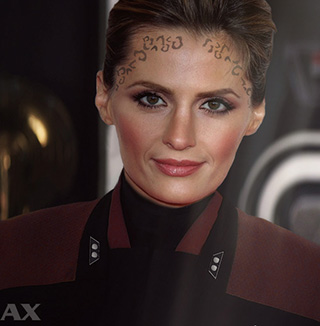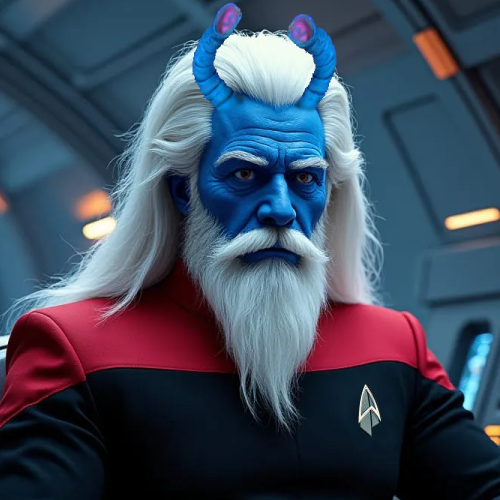The reactor whirred with life, the rhythmic hum reassuring to those who understood its workings, a consequence of small vibrations resonating across the reactor’s superstructure as a bioneural processor made nanosecond-scale micro-adjustments to the magnetic containment field surrounding the superheated plasmas at the core of the fusion reactor.
It was nothing new, and it was nothing fancy. The reactor was an economical and utilitarian design, a configuration the Corps of Engineers had deployed for decades to frontier colonies and outposts. Still, as Captain Kiara Feng, head of infrastructure construction for the Corps detachment, stood watching the gauges, she knew how life-changing it would be for the backwater world. It would offer a near-boundless supply of energy, allowing them to deploy a host of modern technologies from industrial replicators and transporter systems to climate control arrays and subspace relays. Life was hard on Duraxis, but this would make it easier.
“It’s crazy to think that last Friday, they relied on hydrocarbon-based systems to power their word,” came the voice of Lieutenant Commander Hana Cho, the Chief Engineering Officer of the USS Pacific Palisades, as she stepped into the control center. “I mean, how the hell do you get by like that?”
Captain Feng chuckled as she turned to the younger woman. “If you don’t mind me asking, commander, where’d you grow up?”
“Mantilles,” Lieutenant Commander Cho replied. “Up until the Academy, of course. Hardly ever make it back that way anymore.” So was the life of a Starfleet officer, going wherever the ship took you, often so far from home that when shoreleave came, it was too far to return to. It’d been almost two years since she’d last been back to Mantillies.
“So you wouldn’t know life as these people know it,” Captain Feng noted. Mantilles had a population in the tens of millions, and it had been part of the Federation for over a century. Such a place was one where such niceties were taken for granted, a place where, like most of the Federation’s core, a post-scarcity economy was in full effect. It was the sort of place that made service in Starfleet possible, where you didn’t worry about putting food on the table or clothes on your back. “Out here, they live with fears and worries none of us have ever had to experience, where a drought means the threat of famine and where a fire means the loss of essential goods and capacity.”
“What would bring one to live in such a place?” Lieutenant Commander Cho wondered aloud.
“Some like it that way,” Captain Feng explained, thinking back to the Vesparans, a group they’d encountered just recently who’d fled Federation industrialism in the hunt for a simpler and more self-sufficient life. “Others simply can’t make another choice. I mean, if you’re born here, and you grow up here, what sort of mobility do you actually have? These borderlands are off the beaten path, and even traders headed for Klingon space typically use a more coreward route.”
“I’d never really thought of it that way,” Lieutenant Commander Cho admitted. “I didn’t even realize places like this existed before the Palisades got orders to come out this way.”
“That’s Federation propaganda at work,” laughed Captain Feng. “Roll with Amit and the rest of us long enough though, and you’ll realize it’s not even half the story.” The mandate of the Archanis Corps of Engineers detachment under Commodore Amit Agarwal was to establish and strengthen civilian infrastructure in the borderlands as part of a multi-pronged initiative to address decades of neglect. “Out here, there are far more worlds like this than like the places where you and I grew up.”
“You’ve given me a lot to think about…” Lieutenant Commander Cho offered, her voice droning off as she became consumed in her thoughts. “But look, it’s getting late. I came down to relieve you so you could head back up and get some sleep.” There wasn’t much to do up on the USS Pacific Palisades as it hung in high stationary orbit over Duraxis, and thus, until they trained up the locals to run the facility, Cho and her staff had been helping the Corps with operations planetside.
“I appreciate that,” Captain Feng smiled as she gave one last lookover the gauges. It’d been a long and dull shift, keeping an eye on a piece of infrastructure that a freshman science cadet could have designed and a freshman engineer could have operated. “I’ll just…”
But suddenly, the captain froze.
“No… it can’t be…” she muttered as her fingers flew across the controls.
“What?” asked Lieutenant Commander Cho as she approached. But then she saw it. Temperature was climbing in the reaction chamber, one hundred and forty megakelvins already, and it was still racing upward. It didn’t make any sense. “How?”
“How doesn’t matter!” Captain Feng replied, dismissing the question. All that mattered was what they were going to do about it. It was as if the injectors driving ion cyclotron resonance heating had gone crazy, and the plasmas at the core of the fusion reaction were now in the midst of a thermal runaway. Heat translated to energy, and all that energy was pushing the containment system to its limits. It wouldn’t be able to keep up for long, and if they lost containment… she didn’t even want to think about what would follow. “Emergency shutdown! Now!”
Lieutenant Commander Cho nodded and hurriedly pulled up a console alongside Captain Feng.
“I’m going to cool the chamber,” Captain Feng declared as she began to feed liquid deuterium into the chamber, keeping a watchful eye on pressure buildup as supercooled heavy hydrogen collided with the superheated plasmas at the core’s center. “Can you disable the injectors?”
“On it!” Lieutenant Commander Cho confirmed as she brought up the injector controls and entered the commands to power them down.
But nothing happened.
She tried again.
Still nothing.
“Controls unresponsive!” Lieutenant Commander Cho lamented as she slammed her hand against the display in frustration, fully aware of what would happen if they couldn’t depower the ICRH injectors. “Microwave emissions still increasing!”
“Take over for me!” Captain Feng ordered as she switched spots with the younger engineer, thinking that maybe she’d have better luck with the injectors.
When Lieutenant Commander Cho drew up at the station where Captain Feng had been working, her eyes widened. “The pressure build-up… this is way outside operating parameters.” Standard procedures called for a slower rate of coolant release to minimize the risk of an explosive decompression – but then again, those procedures were for a controlled shutdown. On a starship, if something went wrong, you could eject the core. Here on the surface of Duraxis though, they had neither the time for a measured cooldown, nor the ability to eject the core.
”I know what my reactor can withstand!” Captain Feng insisted. “Besides, if we don’t cool this thing down, a blow off is the least of our worries!” The resulting crater, if they lost containment, would be a kilometer in diameter, and not a single structure within a dozen kilometers would be left standing. They couldn’t allow that to happen.
Turning her attention to the injector controls, Captain Feng tried, just as Lieutenant Commander Cho had before her, to power down the injectors. But her experience was the same as the Chief Engineer of the USS Pacific Palisades. No matter what she did, the microwave emissions just kept climbing. It was as though the system took her inputs and promptly disregarded them. It made no sense.
“What the hell is wrong with our injector control system?!” Captain Feng grumbled. The reactor was built with redundancies upon redundancies. She knew. She’d installed many of them herself. They couldn’t all fail at the same time… “Screw it! I’m going for the EPS trunk!” If the ICRH injectors would not accept her inputs, she’d just deprive them of fuel manually. “Just keep coolant flowing to buy me time, and vent what you can to avoid a blowoff!”
“Yes ma’am,” Lieutenant Commander Cho replied, her eyes never leaving the gauges and her fingers never leaving the keys. The was tickling the dragon, riding it to its limits, and she couldn’t make a mistake.
Captain Feng raced out of the control room into the interior superstructure of the reactor. Time was not on their side. She needed to get to the main trunk of the reactor’s EPS grid, and she needed to get there now!
After what felt like an eternity, but in reality was less than a dozen seconds, Captain Feng finally reached the main power distribution panel. She ripped the duranium cover straight off the hinges and was met with a twisted mess of circuitry. To most, it would have been an unintelligible rat’s nest of couplers and conduits, but she’d built hundreds of these. She knew them inside and out.
Her hand shot straight into the middle of the chamber, and without a second thought as to if she was right or what the consequences would be, she yanked the coupler out that she was certain fed the microwave injectors.
Sparks flew as it came free, the now-free supercharged ions of electroplasma arcing through the negatively-charged atmosphere as they sought out a positive grounding with the surfaces beneath. The force launched the sixty kilogram frame of Captain Feng off her feet.
The captain’s head hit the deck hard. But she had to fight through it.
They weren’t out of the woods yet. The rhythmic whir of the containment field was gone now, replaced by a frenzied scream as the containment system tried, with all its might, to vigorously oscillate the magnetic fields to restrain the impossibly-energized fusion reaction. Even with ion cyclotron resonance heating subsided, the plasmas at the core were still energized over tolerable levels, and the coolant wasn’t doing enough.
They needed to quench this thing, and quickly. Captain Feng forced herself back to her feet, her vision splotchy as she struggled back to the control center.
As she stepped back into the control system, Lieutenant Commander Cho gave her an update. “Injectors have been disabled, but lingering reaction is still at critical lev…” she explained, glancing over quickly at the older engineer. There was blood running down the side of her face. “Oh shit! Captain, you’re bleeding!”
“We’ll all be worse soon if we don’t stop this thing completely,” Captain Feng snapped as she reviewed the readings on the gauges. The liquid deuterium, even at the high rate of flow they’d chosen, wouldn’t be enough. Not before the containment system, screaming in the background, gave out. They needed something more bold. “We need to go for a magnetic quench.”
“You mean crank the mag emitters to the moon?” Lieutenant Commander Cho asked as a wave of terror washed across her face. “That’ll cause existing containment to lose coherence.” The system would not be able to keep up with the extreme flux density that’d be caused by what Captain Feng was proposing.
“Doesn’t matter if the reaction is fully quenched,” Captain Feng replied as she brought the emitters up. “Shattering the field lines will induce rapid destabilization of the plasmas.”
“Sure, but there’s still many megapascals of pressure in this thing, and all that’s holding that in place is the existing containment field,” Lieutenant Commander Cho warned. “As soon as it scrambles that, we’ll have a blow off.”
“A pressure blow off is better than a reaction runaway!” Captain Feng shouted back as she queued the instructions into the system. “This plant may not survive, but the colony will.” Of course, what that also meant was that they might not make it either. There were more important things at stake though, and she didn’t hesitate. Not even for a moment. “Going with two fifty kilogauss. You’ve got ten seconds to vent what you can before the rest goes free.”
Lieutenant Commander Cho worked frantically to let off as much pressure as she could, the pressure they’d created by introducing coolant against the plasmas at such a high flow rate. It’d been necessary to buy time to get the injectors shut down, but now it could be their end.
As the seconds ticked down, she could see it wasn’t venting fast enough…
And then her ten seconds were up.

 Bravo Fleet
Bravo Fleet


















